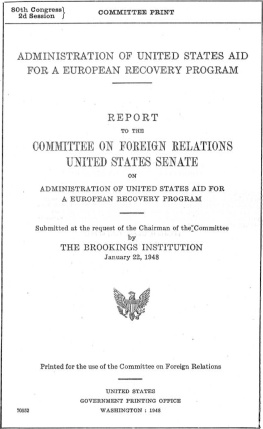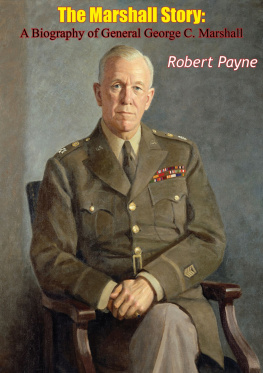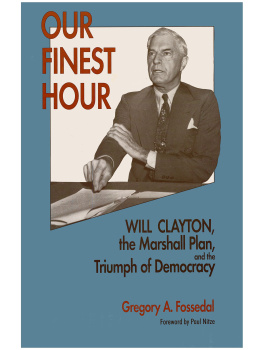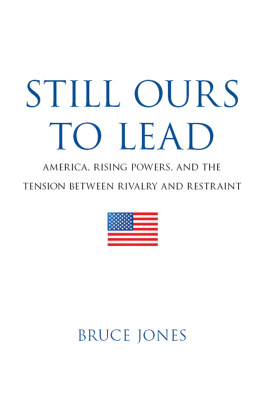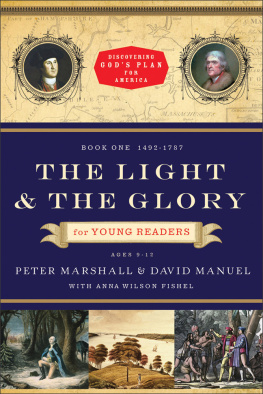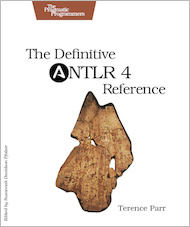Bruce D. Jones - The Marshall Plan and the Shaping of American Strategy
Here you can read online Bruce D. Jones - The Marshall Plan and the Shaping of American Strategy full text of the book (entire story) in english for free. Download pdf and epub, get meaning, cover and reviews about this ebook. year: 2020, publisher: Brookings Institution Press, genre: Politics. Description of the work, (preface) as well as reviews are available. Best literature library LitArk.com created for fans of good reading and offers a wide selection of genres:
Romance novel
Science fiction
Adventure
Detective
Science
History
Home and family
Prose
Art
Politics
Computer
Non-fiction
Religion
Business
Children
Humor
Choose a favorite category and find really read worthwhile books. Enjoy immersion in the world of imagination, feel the emotions of the characters or learn something new for yourself, make an fascinating discovery.
- Book:The Marshall Plan and the Shaping of American Strategy
- Author:
- Publisher:Brookings Institution Press
- Genre:
- Year:2020
- Rating:3 / 5
- Favourites:Add to favourites
- Your mark:
- 60
- 1
- 2
- 3
- 4
- 5
The Marshall Plan and the Shaping of American Strategy: summary, description and annotation
We offer to read an annotation, description, summary or preface (depends on what the author of the book "The Marshall Plan and the Shaping of American Strategy" wrote himself). If you haven't found the necessary information about the book — write in the comments, we will try to find it.
The Marshall Plan and the Shaping of American Strategy — read online for free the complete book (whole text) full work
Below is the text of the book, divided by pages. System saving the place of the last page read, allows you to conveniently read the book "The Marshall Plan and the Shaping of American Strategy" online for free, without having to search again every time where you left off. Put a bookmark, and you can go to the page where you finished reading at any time.
Font size:
Interval:
Bookmark:
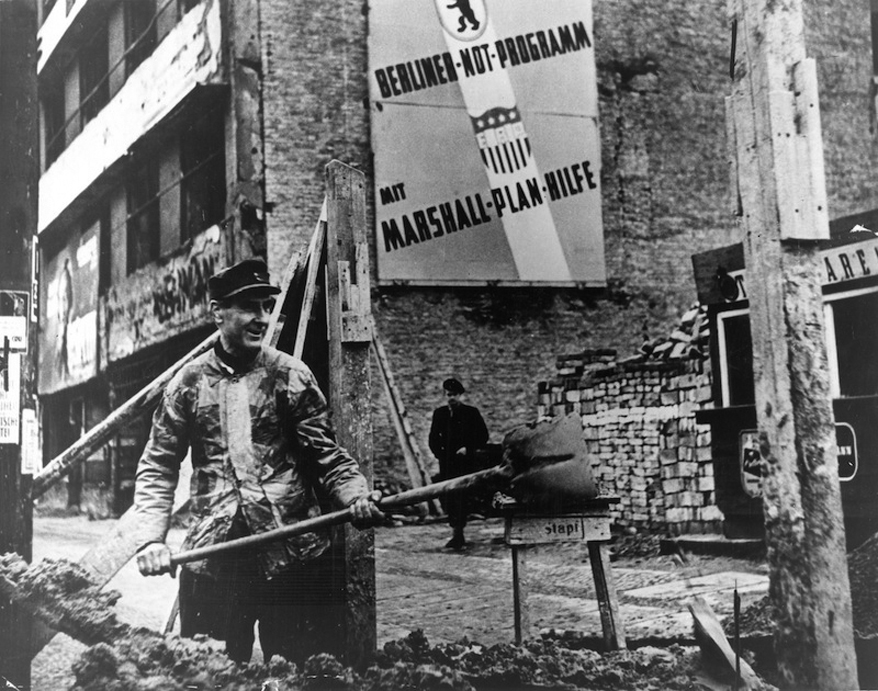
German worker is helping to lay the foundation for one of the low-cost housing projects financed by the Marshall Plan.
COURTESY OF THE GEORGE C. MARSHALL FOUNDATION, LEXINGTON, VIRGINIA
THE MARSHALL PLAN
AND THE SHAPING OF AMERICAN STRATEGY
BRUCE JONES
EDITOR
With a foreword by
STROBE TALBOTT
BROOKINGS INSTITUTION PRESS
Washington, D.C.
Copyright 2017
THE BROOKINGS INSTITUTION
1775 Massachusetts Avenue, N.W., Washington, D.C. 20036
www.brookings.edu
All rights reserved. No part of this publication may be reproduced or transmitted in any form or by any means without permission in writing from the Brookings Institution Press.
The Brookings Institution is a private nonprofit organization devoted to research, education, and publication on important issues of domestic and foreign policy. Its principal purpose is to bring the highest quality independent research and analysis to bear on current and emerging policy problems. Interpretations or conclusions in Brookings publications should be understood to be solely those of the authors.
Library of Congress Cataloging-in-Publication data are available.
ISBN 978-0-8157-2953-2 (cloth: alk. paper)
ISBN 978-0-8157-2954-9 (ebook)
9 8 7 6 5 4 3 2 1
Typeset in Bembo
Composition by Elliott Beard
CONTENTS
Strobe Talbott
Bruce Jones and Will Moreland
FOREWORD
BROOKINGS IN WAR AND PEACE
Strobe Talbott
The European Recovery Program, commonly known as the Marshall Plan, was a pivotal undertaking in Americas emergence as a global power and a protector of its fellow democracies on the far side of the Atlantic. Winston Churchill famously hailed it as the most unsordid act in history. The historian Norman Davies was less grandiloquent but more to the point in identifying the motive behind the U.S. investment of $13 billion in the rehabilitation of European economies: he called it an act of the most enlightened self-interest in history.
With the wisdom of hindsight, the Marshall Plan deserves another accolade. By transforming a wartime alliance into a transatlantic community based on shared interests and values that was the bedrock of the world order for decades to come, it was a stunning and sustained success and an exemplar for American foreign policy in the future.
We at Brookings have an institutional interest in the Marshall Plan, since our predecessors were involved in refining it and helping a Democratic administration shepherd it through a Republican-controlled Congress. We regard our Institutions contribution to that process as an iconic example of our ethos, which includes nonpartisanship, and our mission, which is the improvement of governance. Hence, as we reflect on Brookingss legacy in its centenary year, the publication of this book.
Our institution was the worlds first independent public policy research organization. Its birth and maturation coincided with Americas emergence as a decisive actor on the world stageand, in particular, on the battlefields of the two world wars.
In November 1914 our founding trustees drew up the articles of corporation for what would become the Brookings Institution during the last days of the first Battle of Ypres; in March 1916 they drafted a public prospectus while the Battle of Verdun was raging; and they opened for business in October of that year, five months before President Woodrow Wilson sent the American soldiers over there.
Four months later, Wilson appointed the vice chair of our board, Robert S. Brookingsa businessman, educator, and philanthropist from St. Louisto the War Industries Board. The experience convinced Brookings that sound public and national security policy required a robust partnership between government and the private sector.
In the 1920s several of our scholars focused on European recovery from the Great War. During that decade, Robert S. Brookings assumed board leadership of the institution that came to bear his name. In 1926, six years before his death, he published a pamphlet laying out his vision of a European economic union.
During the 1930s Brookings scholars grappled with the monetary strains in the Great Depression and, once that crisis was over, the challenge of creating a stable, open global economy based on international political cooperation. Leading much of that work was Leo Pasvolsky, an early recruit who earned a Ph.D. in economics from the graduate school that was part of the Institution in its early years. He also became the first of our scholars to pass back and forth numerous times through the revolving door between Brookings and the U.S. government, with stints in the Commerce and State departments. In early 1941 Pasvolsky accepted a full-time job, primarily as an adviser to Secretary of State Cordell Hull, at the level of an assistant secretary while keeping in close though informal touch with Brookings president Harold Moulton.
After Pearl Harbor, the Institution aligned its agenda with yet another war effort. From their offices on Lafayette Square, less than two hundred yards from the White House lawn, our scholars produced reports on how to meet the manpower needs of mobilization, ensure electrical power for the manufacture of armaments, and boost the production of gasoline, tires, and automobiles for the Army. Other projects included advice to Canada and Great Britain on rationing, subsidies, and price controls, as well as an assessment of German manpower as a measure of how long the Nazi war machine could remain on the offensive.
As early as the grim year of 1942, the Institution was already looking toward eventual victory. It published a book by Arthur Millspaugha political scientist, economist, and diplomat who had close ties to Brookings and Moultontitled Peace Plans and American Choices: The Pros and Cons of World Order. The first option was something of a straw man: an America on its own that would simultaneously assume international responsibilities while avoiding direct and formal commitments or entanglements outside this Hemisphere, a contradiction that Millspaugh clearly saw as a fatal flaw. The second was a British-American alliance at the core of a Union of Democracies that would cooperate with the yet-to-be-formed United Nations. The third was a global network of regional arrangements
In addition to U.S. leadership, the world and America itself needed a universally representative organization to serve as the architecture of a lasting peace. In 1943, Pasvolsky, from his position at the right hand of Secretary Hull, was the principal drafter of the United Nations Charter. The UNs most powerful body, the Security Council, would consist of a small inner circle of permanent members including the big three (the United States, the United Kingdom, and the Soviet Union), each with a veto over any substantive resolution. This feature would soon
As the Third Reich crumbled in 1945, another totalitarian empire laid the ground for territorial gains westward, initially and ignominiously with American and British acquiescence. Meeting in Yalta that February, the big three victorsFranklin Roosevelt, Churchill, and Joseph Stalinformally carved up the map of Europe, consigning much of its East to nearly a half century of subjugation.
While the U.S. government was accommodating Stalins expansionism, many Americans, including members of Congress, were transferring their vigilance from Nazis in their midst to Soviet fellow travelers and spies. The House Un-American Activities Committee (HUAC) was already a bellwether of the Red Scare and the McCarthy years: it had been ferreting out suspected Soviet sympathizers since its inception in 1938. After V-E Day in May 1945, HUAC was elevated from a special committee that convened intermittently to a more powerful standing one. One of its most zealous Republican members, Karl Mundt of South Dakota, asked Moulton for Brookingss advice on the standards by which its conduct might be guided.
Next pageFont size:
Interval:
Bookmark:
Similar books «The Marshall Plan and the Shaping of American Strategy»
Look at similar books to The Marshall Plan and the Shaping of American Strategy. We have selected literature similar in name and meaning in the hope of providing readers with more options to find new, interesting, not yet read works.
Discussion, reviews of the book The Marshall Plan and the Shaping of American Strategy and just readers' own opinions. Leave your comments, write what you think about the work, its meaning or the main characters. Specify what exactly you liked and what you didn't like, and why you think so.

